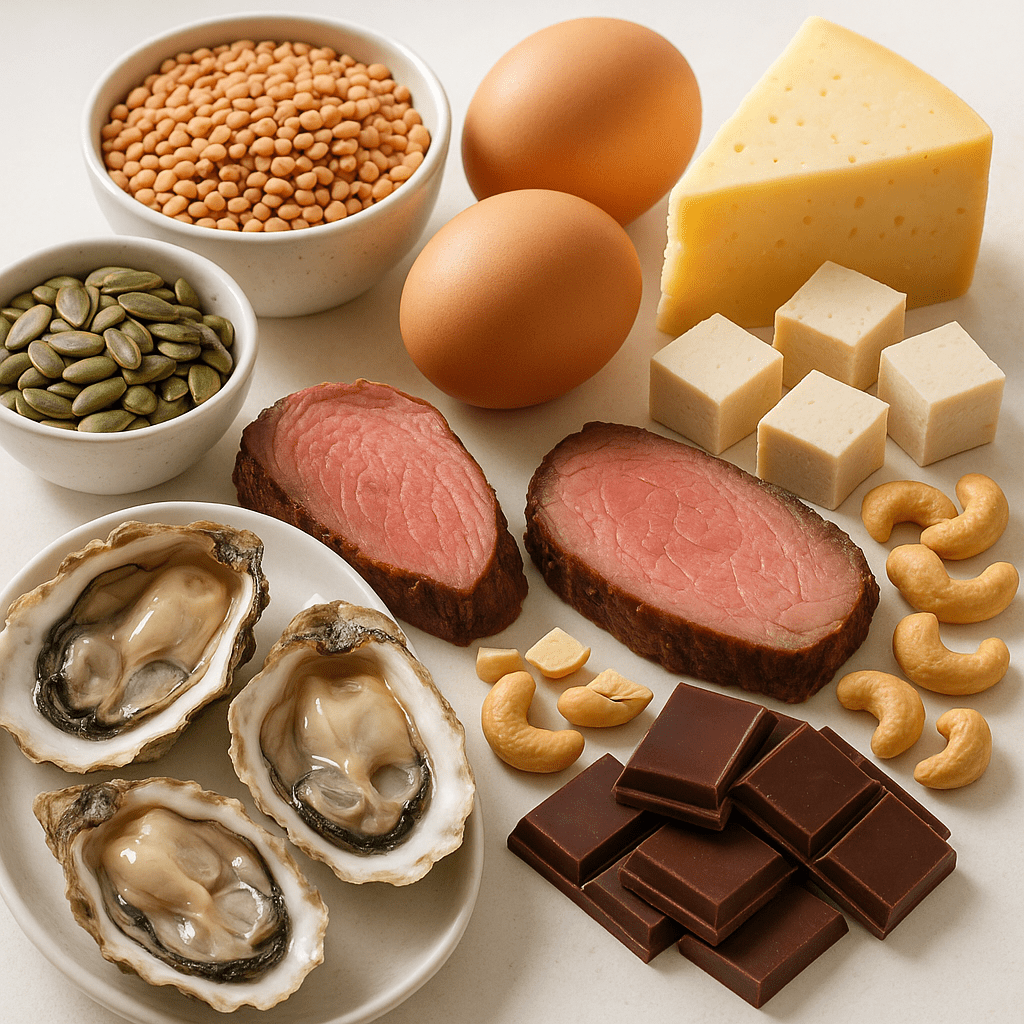Zinc is a vital trace mineral that performs a number of important functions in our bodies. Although we need it in small amounts, this mineral is essential for the immune system, wound healing, DNA synthesis, and the functioning of over 300 enzymes. In today’s world, when we face increased stress and various challenges to the immune system, adequate zinc intake becomes even more important. Unfortunately, the body cannot produce or store it, so we must constantly obtain zinc through food or supplements. In this article, we will discuss in detail the health benefits of zinc, signs of deficiency, best sources, proper dosage, and possible side effects.
What is zinc and why is it essential for the body?
Zinc is an essential trace mineral that is vital in small amounts for our bodies. Unlike some other nutrients, the human body cannot produce it itself or store it efficiently, so we must constantly obtain zinc through food. This mineral is involved in a wide range of biochemical processes, from the immune system to hormone synthesis.
Zinc is essential for the synthesis of DNA and proteins, so it is directly related to cell division and growth. In addition, zinc plays an important role in the activity of more than 300 enzymes that are involved in metabolism, support wound healing and help neutralize free radicals. It is also important for the normal sense of taste and smell, so its deficiency can affect not only the body, but also the quality of life.
According to the World Health Organization, zinc not only strengthens immunity, but is also essential for normal growth and development, brain function and hormonal balance. Therefore, zinc is not just an “immune system booster” – its significance for the body is much broader.
Key Health Benefits of Zinc
The benefits of zinc for the body are diverse and scientifically proven. While everyone knows its importance for the immune system, this mineral performs many other important functions.
Zinc and immunity
Zinc is one of the most important minerals that support the normal functioning of the immune system. It stimulates the production and activity of white blood cells, especially T-lymphocytes, which fight infections. Studies show that zinc supplements taken within the first 24 hours of the onset of cold symptoms can shorten the duration of the illness by up to 33%.
In addition, zinc helps fight inflammation in the body by acting as a natural antioxidant. It protects cell membranes from oxidative stress and helps regulate the inflammatory response, which is especially important for the prevention of chronic inflammatory conditions.
Zinc also helps the body cope with stress, which often weakens the immune system. Fatigue and frequent infections can be one of the first signs that your body is lacking this important mineral.
Zinc for skin, hair and nails
Zinc is essential for healthy skin, hair and nails. It is involved in collagen synthesis, promotes skin regeneration and wound healing. Scientific studies confirm that zinc deficiency is often associated with skin problems such as acne, eczema and dermatitis.
Due to its anti-inflammatory effects, topical application of zinc or its consumption with food can help reduce acne inflammation and accelerate the healing of skin wounds. Zinc is also essential for healthy hair and nails, as it is involved in the production of keratin, the main protein in hair and nails.
Many people, especially women, take zinc supplements to improve the condition of their hair, skin and nails, and although it should not be the first choice for solving skin problems, adequate zinc levels in the body are undoubtedly important for these structures.
Zinc and Reproductive Health
Zinc plays an important role in the reproductive health of both men and women. In men, zinc is necessary for normal testosterone production, sperm quality and motility. Studies show that adequate zinc intake can help maintain healthy sperm count and quality.
In women, zinc helps maintain hormonal balance, particularly related to estrogen and progesterone levels. It is also important for normal egg maturation and fertility. During pregnancy, adequate zinc intake is essential for proper fetal development, especially for the formation of the nervous system and brain.
Studies also suggest that zinc may help reduce symptoms of premenstrual syndrome (PMS) and alleviate some of the discomforts associated with pregnancy, although more scientific evidence is needed in this area.
Signs and Symptoms of Zinc Deficiency
Zinc deficiency can manifest itself in many ways and affect many body systems. It is important to recognize the early signs so that timely measures can be taken.
The first signs of zinc deficiency are often non-specific – increased susceptibility to infections, slower wound healing, fatigue and loss of appetite. Over time, more pronounced symptoms may appear: hair loss, skin rashes, white spots on the nails, taste and smell disorders.
Severe zinc deficiency can lead to more serious health problems, such as dermatitis, diarrhea, increased risk of infections and even cognitive impairment. In children, zinc deficiency can slow growth and development, which can have long-term consequences.
The following groups are at higher risk of zinc deficiency:
- vegetarians and vegans, as zinc in plant-based foods is more difficult to absorb
- elderly people due to reduced food absorption
- people with gastrointestinal diseases (Crohn’s disease, celiac disease)
- those who consume a lot of alcohol
- pregnant and breastfeeding women due to increased zinc needs
- people taking certain medications, especially diuretics and some antibiotics
If you suspect a zinc deficiency, it is important to consult a healthcare professional.

Self-medication with zinc supplements without medical supervision can cause imbalances in the absorption of other minerals, especially copper and iron.
The best sources of zinc in food
A properly balanced diet should ensure sufficient zinc levels, but it is important to know which foods contain the most zinc and how to optimize its absorption.
The richest sources of zinc are animal products, especially:

-
oysters – the absolute champion of zinc (one serving can provide even several times more than the recommended daily allowance)
-
red meat, especially beef and lamb
-
poultry, especially darker meat
-
seafood, especially crab and shrimp
-
eggs, especially yolks
dairy products, especially cheese and yogurt
Plant sources of zinc include:
- legumes (beans, lentils, peas)
- nuts and seeds (pumpkin seeds, sesame seeds, cashews)
- whole grains
- oats
- tofu and other soy products
- dark chocolate
It is important to note that zinc in plant products is absorbed worse than in animal products. This is due to the phytates they contain – compounds that can interfere with the absorption of zinc. Vegetarians and vegans are recommended to consume 50% more zinc than indicated in the general recommendations.
To improve zinc absorption from plant-based foods, it is recommended to:
- enjoy soaked, sprouted or fermented legumes and grains
- combine zinc sources with vitamin C sources
- avoid drinking tea or coffee with meals, as the tannins in them can interfere with zinc absorption
- consider taking zinc supplements if you are at risk
The Lithuanian Ministry of Health’s recommendations also emphasize that a balanced diet with a variety of foods is the best way to ensure sufficient amounts of all minerals, including zinc, in the body.
Recommended Daily Allowance and Supplementation Guidelines
Zinc needs vary depending on age, gender, and other individual factors. Here are the basic recommended daily allowances:
- men: 11 mg per day
- women: 8 mg per day
- pregnant women: 11-12 mg per day
- breastfeeding women: 12-13 mg per day
- children and adolescents: 3-11 mg per day, depending on age
- people over 65: 8-11 mg per day
It is important to note that the upper safe limit for zinc for adults is 40 mg per day. Exceeding this limit for a long time can cause health problems.
Zinc supplements may be beneficial for the following people:
- vegetarians and vegans
- those with certain gastrointestinal conditions
- the elderly
- pregnant and breastfeeding women (only after consulting a doctor)
- athletes undergoing intense physical exertion
- people with a confirmed zinc deficiency
When choosing a zinc supplement, it is worth paying attention to its form. The most absorbable forms are zinc picolinate, zinc citrate, zinc bisglycinate and zinc gluconate. These forms have higher bioavailability than regular zinc oxide or zinc sulfate.
It is recommended to take zinc supplements with meals to avoid stomach upset. It is also important to note that zinc supplements should not be taken with iron, calcium or copper supplements, as they may compete for absorption. At least 2 hours should be left between taking these supplements.
Before taking any supplements, including zinc, consult a doctor or nutritionist who will be able to assess your individual needs and provide personalized recommendations.
Possible Side Effects and Interactions
While zinc is essential for health, taking too much of it can cause unwanted effects. It is important to be aware of possible side effects and interactions with other substances.
The most common side effects of zinc supplements, especially when taken on an empty stomach, include:
- nausea and vomiting
- stomach cramps and pain
- diarrhea
- headache
- changes in taste
Long-term use of excessive amounts of zinc (more than 40 mg per day) can lead to more serious problems:
- copper deficiency, as zinc competes with copper for absorption
- decreased levels of “good” cholesterol
- weakened immune system (paradoxically, too much zinc can have the opposite effect than desired)
- impaired iron absorption
Zinc may also interact with certain medications:
- antibiotics (tetracyclines and quinolones) – zinc should be taken at least 2 hours before or 4-6 hours after these antibiotics
- diuretics – some of them can increase the excretion of zinc in the urine
- penicillamine – a drug for rheumatoid arthritis
- HIV drugs – zinc may reduce their effectiveness
Too much zinc Signs of overdose to watch out for:
- severe nausea and vomiting
- stomach pain and diarrhea
- headaches and migraines
- loss of appetite
- immune system dysfunction
Zinc supplements should be avoided or taken only under medical supervision by people with:
- kidney disease
- certain blood vessel diseases
- taking immunosuppressive medications
- having allergies to any of the supplement’s ingredients
If you experience any unusual symptoms while taking zinc supplements, stop taking them and consult your doctor. Always start with lower doses and see how your body responds.
Summary
Zinc is an essential mineral that performs many important functions in our bodies, from supporting immunity to wound healing to hormone production. While most people can get enough zinc from a balanced diet, certain groups, such as vegetarians, the elderly, or those with digestive disorders, may experience a deficiency.
A healthy, varied diet that includes sources of zinc—meat, seafood, legumes, nuts, and seeds—should be the first step in ensuring adequate levels of this mineral.

However, it is worth remembering that zinc absorption from plant sources is poorer, so vegetarians and vegans may need additional amounts.
While zinc supplements can be beneficial in cases of deficiency, they should be used responsibly and best under the supervision of a healthcare professional. Too much zinc can cause side effects and interfere with the absorption of other important minerals, such as copper and iron.
Finally, if you suspect zinc deficiency due to your symptoms, it is recommended to consult a doctor who will be able to suggest the most appropriate tests and treatments. Remember that a balanced diet and adequate micro and macronutrients are the foundation of good health.
Frequently asked questions
What are the early signs of zinc deficiency?
Early signs of zinc deficiency include more frequent infections, slower wound healing, skin problems (rash, dryness), hair loss, loss of appetite, decreased sense of taste and smell, and fatigue. Mood swings and decreased libido may also occur.
Who should consider taking zinc supplements?
Zinc supplements are worth considering for vegetarians and vegans, older people with gastrointestinal diseases (Crohn’s disease, celiac disease), pregnant and breastfeeding women, people who exercise intensively, and those with a confirmed zinc deficiency. It is recommended to consult a doctor before starting to take supplements.
Can zinc be taken daily? What is a safe dose?
Yes, zinc can be taken daily, as long as doses do not exceed the recommended doses: 11 mg per day for men, 8 mg for women. The safe upper limit for adults is 40 mg per day. Long-term use of higher doses can cause copper deficiency and other health problems.
Is it safe to take zinc with other minerals or vitamins?
Zinc is best taken separately from iron, copper, and calcium supplements, as these minerals compete for absorption. It is recommended to keep at least 2 hours between taking them. Zinc pairs well with vitamin C, which can improve its absorption, but it is always a good idea to consult your doctor about individual supplementation.
Can too much zinc be harmful?
Yes, too much zinc can be harmful. Long-term use of more than 40 mg per day can cause copper deficiency, reduce “good” cholesterol levels, weaken the immune system, and interfere with iron absorption. Acute symptoms of overdose include nausea, vomiting, diarrhea, headache, and stomach cramps. If you suspect a zinc overdose, consult your doctor.
